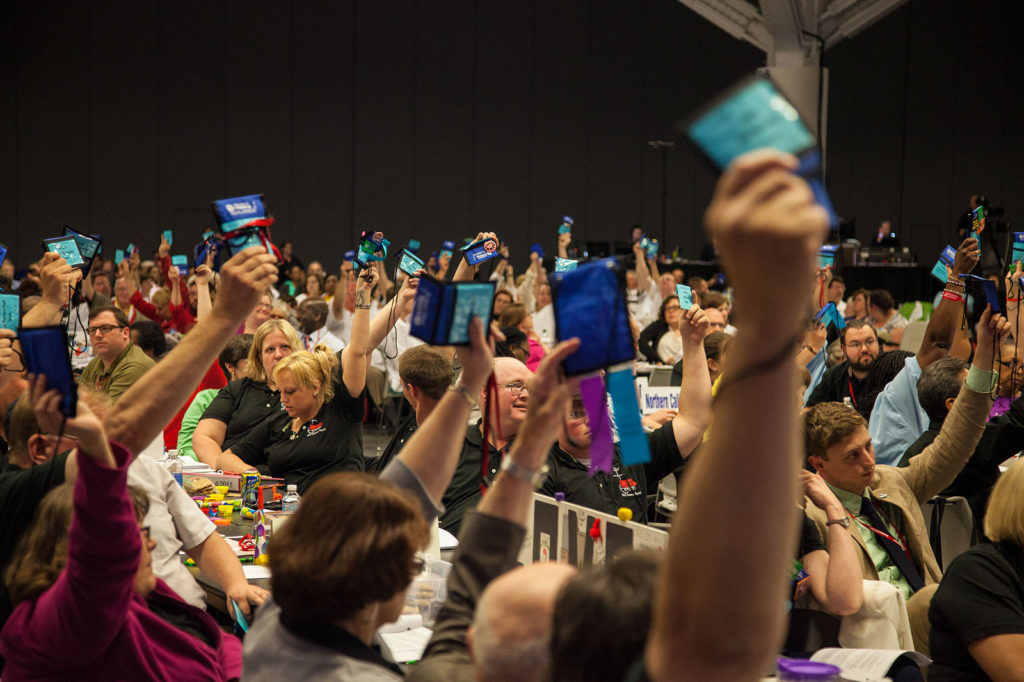The faith community’s role in the divestment movement
 When the United Church of Christ took up a resolution at the 2015 General Synod in late June that, in part, calls on the settings of the church to divest their holdings from companies profiting from Israel’s occupation of the West Bank and Gaza, the denomination wasn’t alone in considering the move. Nor was it the first.
When the United Church of Christ took up a resolution at the 2015 General Synod in late June that, in part, calls on the settings of the church to divest their holdings from companies profiting from Israel’s occupation of the West Bank and Gaza, the denomination wasn’t alone in considering the move. Nor was it the first.
Faith groups, Christian denominations in the United States in particular, have wrestled with the BDS movement — boycott, divestment and sanction — which emerged a decade ago. Scholars and political scientists have said that while the reaction to BDS has been “vociferous, there are those who believe it is the last, best chance for nonviolent pressure to influence policy change,” said Pete Moore, a professor of political science at Case Western Reserve University in Cleveland, who presented the General Synod background session related to the resolution and the Israeli-Palestinian conflict.
“This resolution does call for divestment and boycotts, but it is not a blanket endorsement of the Palestinian civil society BDS movement,” said Peter Makari, UCC area executive for the Middle East and Europe. “The difference is that the BDS Movement makes three demands . . . This resolution relates to the occupation.”
The UCC passed the resolution as a way to express solidarity with Palestinian Christians. It was also clear in the resolution’s language that the divestment is from companies profiting from the occupation — not the state of Israel itself — and that the boycotts are of products produced in Israeli settlements in Palestinian territories.
“Boycott and divestment are nonviolent strategies of resistance, called for by Palestinian leaders and Christians,” said the Rev. James Moos, executive minister of UCC Wider Church Ministries. “The UCC condemns all forms of violence and anti-Semitism, and reaffirms the right of Israel to exist securely within its borders. We’ve also recognized the right of Palestinians to live in sovereignty and peacefully within their own state.”
Two other denominations also considered divestment-related actions during the meetings of their governing bodies this summer. The Episcopal Church, with 1.7 million members, opted to reject an investigation into whether or not its investments support the occupation, and the Mennonite Church USA, with almost 100,000 members, tabled any decisions on divestment until 2017.
The debates by the UCC, Episcopal Church and Mennonites come a year after the Presbyterian Church USA voted by a slim margin to approve a divestment resolution and the United Methodist Church sold off $110,000 worth of stock in security company G4S. G4S is one of the five companies named in the UCC resolution that has been accused of human rights violations in the Palestinian territories. The Methodists also voted in 2012 to urge governments around the world to boycott goods that are produced or made in Jewish settlements in the occupied lands.
Advocates within the UCC and the Presbyterian Church have worked for decades trying to use economic leverage as a way to influence change within companies that profit from the occupation.
Moore was uncertain of the impact of divesting from companies profiting from the occupation in forcing policy changes from the Israeli government, which is currently the most hardline government in the nation’s history, he said. “I don’t think it will make that kind of impact,” Moore said.
But the faith community isn’t the only group wrestling with its investments. Dutch pension funds and Danish banks have also withdrawn their investments from Israeli banks, French company Veolia Environment has lost about $26 billion in contracts –– according to Omar Barhgouthi, head of the BDS movement –– after it was targeted as part of a BDS campaign, and SodaStream’s revenue declined by 30 percent in the first quarter of 2015 — SodaStream is manufactured in a settlement in the West Bank.
The BDS movement was started by the Palestinian civil society in 2005 and is based in Ramallah. The movement calls for an end to the occupation of the West Bank and Gaza –– lands seized in the 6-Day War in 1967 –– and removal of the separation barrier; an end to the discrimination of Arab-Palestinians and their recognition as full Israeli citizens; recognition of the “right of return” for Palestinian refugees to return to the region in accordance with UN Resolution 194.
“The Israeli government has recognized that BDS is a strategic threat,” Bargouthi said. “In fact, it passed a law that prohibits advocating for BDS, and this was condemned by some U.S. media because it restricted free speech.”
As tenuous as the debate about BDS has been, the Rev. Jim Antal, conference minister of the Massachusetts Conference of the UCC, summarized it best when he stressed the importance of local and regional settings of the church to continue staying in relationship with Jewish leaders on the issue. “It will be one of the hardest things in your ministry,” Antal said at General Synod, “and for the sake of peace in Middle East, it will be one of the most important.”
Answers to Frequently Asked Questions about the resolution can be found here.
Related News
A Prophetic Call for Justice and Peace in Palestine
The executive leaders of the United Church of Christ have issued the following statement...
Read More‘Love is Greater Than Fear’: Regional Youth Events get to the heart of gospel message
United Church of Christ teens attending this summer’s Regional Youth Events (RYE) are...
Read MoreUCC desk calendars available to order now
Prepare for your day, month and year with the United Church of Christ desk calendar —...
Read More


